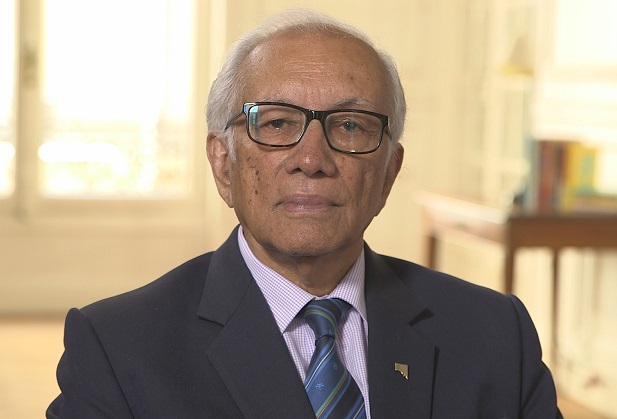
Malaysia
Mavath R. Chandran
- Advisor to The Roundtable on Sustainable Palm Oil (RSPO) and Honorary Member (Agribusiness)
Born Singapore, 1938; BS in Agricultural Economics and Technology, University of Adelaide (1960)
“So it’s grown—[the] RSPO—and overall, I must say, it has proven to be a success. I think we have created a demand for sustainable palm oil.”
Summary
Mavath R. Chandran has been one of the most influential figures in the Malaysian palm oil industry. After graduating, he briefly joined British-owned Harrisons & Crosfield, where his father had been the first Malay plantation manager at a foreign-owned company. Chandran joined Belgium-owned Socfin in 1969, and eventually became head of plantations. After retiring from Socfin, he became chief executive of the Malaysian Palm Oil Industry Association in 1999. In this interview, Chandran describes in detail the complex historical relationships between typically European managers and local staff, as well as how this relationship evolved over time up until—and even after—the region gained independence from British rule in the late 1950s. He reflects on the historical and ongoing struggle of race relations in Malaysia, between the majority Malay people, and the smaller—but influential—ethnic Indian and Chinese minorities. He describes the transformation of the Malaysian rubber industry as commodity prices collapsed after the Korean War and the invention of synthetic rubber, and the government’ response in developing the palm oil industry. The government, in partnership with many major plantation companies, launched FELDA (the Federal Land Development Authority) to help organize poor, rural famers into smallholders growing cash crops. In the interview, Chandran—who assisted with the development of FELDA schemes while working in the private sector—explains why this program was so important, to both smallholders and private companies alike. Chandran goes on to discuss the wave of Malaysianization that swept the region after the end of European colonialism in the 1970s and 1980s, and the consequences, especially the legacy of increased government-intervention in the economy and the presence of corruption. Chandran concludes the interview by discussing recent developments in the palm oil industry, focusing specifically on how it has responded to increasing concerns about sustainability and environmental responsibility. He discusses how the new standards for sustainable agriculture were negotiated and adopted, and reveals the background to the formation of the Roundtable of Sustainable Palm Oil in 2003. Chandran acknowledges that the enforcement of new sustainable growing measures through, what he calls “social audits,” remains challenging.
Video Clips by Topic
Corruption
Mavath R. Chandran, a veteran executive in the Malaysian palm oil industry and an advisor to the Roundtable of Sustainable Palm Oil, discusses the strict ethical codes that his former employer, Belgian-owned Socfin, put in place to control corruption, and notes how Singapore has been able to counter corruption by paying officials high salaries.
Keywords:
Corruption, Malaysia
Ethnicity and Race
Mavath R. Chandran, a veteran executive in the Malaysian palm oil industry and an advisor to the Roundtable of Sustainable Palm Oil, discusses how the British colonial regime contributed to the complex ethnic make-up of modern day Malaysia. He discusses at length the complexity of the ethnic Indian minority, noting that while some groups like his own Malayali community have flourished, the Tamil community has been trapped in poverty.
Keywords:
Malaysia, Ethnicity and Race
Sustainability
Mavath R. Chandran, a veteran executive in the Malaysian palm oil industry and an advisor to the Roundtable of Sustainable Palm Oil, discusses sustainability in the palm oil industry and the challenge of greenwashing.
Keywords:
Malaysia, Sustainability
Additional Resources
- Helena Varkkey, Adam Tysonb and Shofwan Al BannaChoiruzzad, “Palm oil intensification and expansion in Indonesia and Malaysia: Environmental and socio-political factors influencing policy,” Forest Policy and Economics, Volume 92, July 2018, pp. 148-159.
- Valeria Giacomin, “The emergence of an export cluster: Traders and palm oil in early 20th century Southeast Asia,” Enterprise & Society, Volume 19, Issue 2 June 2018 , pp. 272-308. https://doi.org/10.1017/eso.2017.10.
- Christoph Kubitza, Vijesh V. Krishna, Zulkifli Alamsyah, and Matin Qaim, “The Economics Behind an Ecological Crisis: Livelihood Effects of Oil Palm Expansion in Sumatra, Indonesia,” Human Ecology, February 2018, Volume 46, Issue 1, pp. 107–116.
- Shakila Yacob (2018) Government, Business and Lobbyists: The Politics of Palm Oil in US–Malaysia Relations, The International History Review, DOI: 10.1080/07075332.2018.1457556.
- Laura Paddison, Jenny Purt, Josephine Moulds, and Oliver Balch, " From rainforest to your cupboard: the real story of palm oil - interactive" The Guardian, November 10, 2014.
- Greetje Schouten and Pieter Glasbergen, “Creating legitimacy in global private governance: The case of the Roundtable on Sustainable Palm Oil,” Ecological Economics, Volume 70, Issue 11, 15 September 2011, pp. 1891-1899.
- Geoffrey Jones and Judith Wale, "Diversification Strategies of British Trading Companies: Harrisons & Crosfield c1900-c1980," Business History, Volume 41, Issue 2, April 1999, pp. 69–101.
Interview Citation Format
Interview with Mavath R. Chandran, interviewed by Valeria Giacomin, Paris, France, June 25, 2018, Creating Emerging Markets Oral History Collection, Baker Library Special Collections, Harvard Business School.
